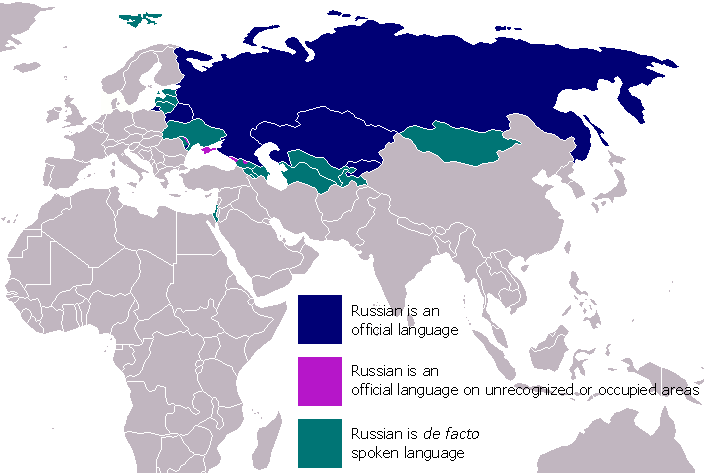File talk:Germanic languages.svg
Appearance
Considerations
[edit]Considerations:
- Create a shade of blue that represents: "Countries/regions in which the mother tongue of the majority of the population is an Germanic-based creole language but the main language of governance is the formal version of the Germanic language"
- Use the color purple that shows the countries/regions where there is a small Germanic-based creole speaking ethnic minority in a country that may or may not use the standard version as the language of government.
- Another shade of blue should refer to the countries in which there is a widely spoken Germanic-based creole language in the nation/region although non of official languages are Germanic.
- Use the color shown below (used to indicate where Russian is spoken) to show countries/regions in which one of the official languages is Germanic but also has the presence of an Germanic-based creole spoken as a lingua franca in informal situations by people who may also be well educated in the formal version of the Germanic language.
- Don't forget to use a green square to show cities/settlements/regions where a Germanic language is a prominent minority language.
- Use dots to show countries to small to see, e.g. Caribbean, Southeast Asia.
- P.S. Don't forget about shading Quebec the right shade.
`
Here are some examples their uses:
- English-based creole languages:
- Jamaica, Sierra Leone, Belize, the Bahamas, Turks and Caicos Islands, the Virgin Island, Anguilla, Antigua and Barbuda, Montserrat, Saint Kitts and Nevis, Barbados, Grenada, Guyana, Trinidad and Tobago, Cayman Islands, Saint Vincent and the Grenadines, Vantu, Torres Strait Islands, the Solomon Islands, and Papua New Guinea are all the countries/dependencies/regions where an Anglo-creole language is the native tongue/lingua franca of the majority population while standard English is the language of government.
- Limonese, Miskito Coast Creole, Colón Creole, Rama Cay Creole, Bay Islands Creole, Bocas del Toro Creole, Bende, Samaná English, Afro-Seminole Creole, Gullah, Aluku, Ndyuka, Paramaccan, Kwinti, Saramaccan, and Aku are all English-based creole languages spoken by a small ethnic minority in a region/country that does not speak their language.
- They are spoken in: the eastern coast of Honduras, Nicaragua, Costa Rica, and Panama roughly stretching from the Caratasca Lagoon in Honduras to the Bocas del Toro Archipelago in Panama; the Bay Islands off the coast of Honduras; the Colombian-controlled Archipelago of San Andrés off the coast of Nicaragua; the Samaná Peninsula in the Dominican Republic; very small, scattered communities in the northeastern Florida wilderness; the South Carolina Lowcountry and the Sea Islands in coastal South Carolina and Georgia; small settlements near the national border in the Maripasoula region of French Guiana; a small community in the interior wilderness of the Marowijne District in Suriname; a small cluster of settlements at the bank of the Coppename River; eastern Suriname wilderness; around the Saramacca River and Suriname River with some populations in French Guiana; an in The Gambia.
- Nigeria, Liberia, Cameroon, Philippines, Singapore, and Malaysia are all countries in which English is not the native tongue but a English-based creole has reached the status of lingua franca in informal settings. Standard English is still used as lingua franca in formal settings.
- Dutch-based creole languages
- They are all extinct or near extinct.
- Afrikaans is a non-creole language/dialect based off Dutch.
- German-based creole languages
- The Unserdeutsch language of Papua New Guinea, Namibian Black German, and Belgranodeutsch of Buenos Aires, Argentina are all the German-based creoles.
- The French controlled half of Saint Martin and the the Fernandino languages on Bioko Island are all the regions in which the majority of the population speaks an Germanic-based creole language but does not have a Germanic language as the official language.
- Refer to this list to get ideas about how to show small countries/regions.
Legend
[edit]|
Countries/dependencies where English has official language status and/or is the main mother tongue.
Countries/dependencies where the mother tongue is an English-based Creole but the main language of government is formal English.
Countries/dependencies in which there is a widely spoken Anglo-creole language in the nation/region although non of official languages are English.
Countries where English is official but is not a widely-spoken language.
Countries in which English is not the native tongue but a English-based creole has reached the status of lingua franca in informal settings. Standard English is still used as lingua franca in formal settings as it is also the official language.
English-based creole languages unique to a small ethnic minority.
Cities/settlements where English is a major minority language and/or has a notable presence large presence.
|
ThisguyYEAH (talk) 03:00, 3 September 2011 (UTC)
Madagascar to be removed
[edit]The blue on Madagascar has to be removed from the map, for its official languages are French and Malgasy, neither one Germanic. — Preceding unsigned comment added by 159.51.236.11 (talk) 13:15, 5 December 2012 (UTC)
Québec, Belgium, and Italy/South Tyrol
[edit]To be removed/corrected: Québec, as its sole official (likewise national) language is French; Wallonia in Belgium, see Québec.
To be added: South Tyrol in the northeast of Italy (German-speaking). — Preceding unsigned comment added by 159.51.236.11 (talk) 13:25, 5 December 2012 (UTC)
Burundi to be removed
[edit]Official languages are French and Kirundi, none of which is Germanic. 85.246.33.91 (talk) 19:29, 20 December 2017 (UTC)

